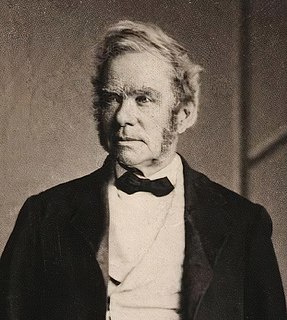A Quote by Josiah Warren
Liberty, then, is the sovereignty of the individual, and never shall man know liberty until each and every individual is acknowledged to be the only legitimate sovereign of his or her person, time, and property, each living and acting at his own cost.
Related Quotes
If every person has the right to defend - even by force - his person, his liberty, and his property, then it follows that a group of men have the right to organize and support a common force to protect these rights constantly. Thus, since an individual cannot lawfully use force against the person, liberty, or property of another individual, then the common force - for the same reason - cannot lawfully be used to destroy the person, liberty, or property of individuals or groups.
It is not the right of property which is protected, but the right to property. Property, per se, has no rights; but the individual - the man - has three great rights, equally sacred from arbitrary interference: the right to his life, the right to his liberty, the right to his property The three rights are so bound together as to be essentially one right. To give a man his life but to deny him his liberty, is to take from him all that makes his life worth living. To give him his liberty but take from him the property which is the fruit and badge of his liberty is to still leave him a slave.
The good citizen will demand liberty for himself, and as a matter of pride he will see to it that others receive the liberty which he thus claims as his own. Probably the best test of true love of liberty in any country is the way in which minorities are treated in that country. Not only should there be complete liberty in matters of religion and opinion, but complete liberty for each man to lead his life as he desires, provided only that in so doing he does not wrong his neighbor.
Coincident with the right of individual property under the provisions of our Government is the right of individual property. . . . When once the right of the individual to liberty and equality is admitted, there is no escape from the conclusion that he alone is entitled to the rewards of his own industry. Any other conclusion would necessarily imply either privilege or servitude.
Liberty ... was a two-headed boon. There was first, the liberty of the people as a whole to determine the forms of their own government, to levy their own taxes, and to make their own laws.... There was second, the liberty of the individual man to live his own life, within the limits of decency and decorum, as he pleased -- freedom from the despotism of the majority.
Everyone has an equal and absolute right to sovereignty over his own body, his own property, and his own life, and to pursue his own happiness in any way that he chooses. No one has the authority to grant rights to anyone else, because human beings already possess all natural rights at birth. These rights include both personal and economic freedoms, and the only way they can be lost is if someone takes them away by force. The only right that an individual does not naturally possess is the right to violate someone else's liberty.
[A] republic . . . [is] a government, in which the property of the public, or people, and of every one of them was secure and protected by law . . . implies liberty; because property cannot be secured unless the man be at liberty to acquire, use or part with it, at his discretion, and unless he have his personal liberty of life and limb, motion and rest, for that purpose.
For everybody has a natural right not only to defend his own person and property against aggressors, but also to go to the assistance and defence of everybody else, whose person or property is invaded. The natural right of each individual to defend his own person and property against an aggressor, and to go to the assistance and defence of every one else whose person or property is invaded, is a right without which men could not exist on earth.
Ought to have a universal compulsory force to move and arrange each part in the manner best suited to the whole. Just as nature gives each man an absolute power over all his members, the social compact gives the body politic an absolute power over all its members." "We grant that each person alienates, by the social compact, only that portion of his power, his goods, and liberty whose use is of consequence to the community; but we must also grant that only the sovereign is the judge of what is of consequence.
Man must know the principle of Creation: giving between each interchanging opposite half of each cycle for the purpose of repeating its giving. This is universal law and each individual must manifest this law. Man will forever war with man until he learns to give his all with the full expectation of equal receiving, and never taking that which is not given as an earned reward for his giving.


































